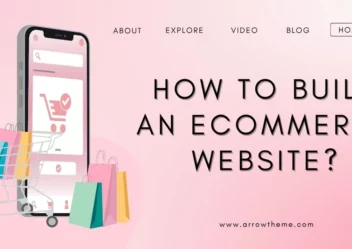10+ Best Online Website Marketplaces To Sell Your Products and Services Online
The Internet has opened up a world of possibilities for entrepreneurs and businesses of all sizes. With just a few clicks, you can now reach millions of potential customers around the globe. One of the best ways to do this is by selling your products and services online through website marketplaces.
In this blog post, we’ll cover a variety of marketplaces, from general eCommerce giants like Amazon and eBay to niche platforms like Etsy and Facebook Marketplace. We’ll also provide you with some tips for choosing the right marketplace for your business.
So, whether you’re just starting or you’re looking to expand your reach, this blog post is for you. Let’s get started!
Some related articles you might be interested in:
- How to Create an Online Marketplace Using WordPress: Beginner’s Guide
- How to Create an Online Course Marketplace Using WordPress
What Is An Online Website Marketplace?
An online website marketplace is a platform that connects buyers and sellers. Sellers can list their products and services on the marketplace, and buyers can browse and purchase them. Marketplaces typically take a commission on each sale.
Why Sell On An Online Website Marketplace?
There are many reasons why you might want to sell on an online website marketplace. Here are just a few:
- Reach a large audience: Marketplaces have millions of active users, so you can be sure to reach a wide range of potential customers.
- Build brand awareness: Selling on a well-known marketplace can help you build brand awareness and credibility.
- Low startup costs: It’s relatively easy and inexpensive to get started selling on most marketplaces.
- Convenient management: Most marketplaces provide you with tools and resources to manage your listings and sales.
How To Choose The Right Online Website Marketplace For Your Business
When choosing an online website marketplace, it’s important to consider your target audience, the type of products or services you sell, and your budget. Here are a few additional factors to keep in mind:
- Fees: Marketplaces typically charge listing fees, transaction fees, and other fees. Be sure to compare the fees of different marketplaces before you choose one.
- Competition: Some marketplaces are more competitive than others. If you’re selling products or services that are in high demand, you may want to choose a marketplace with a lower level of competition.
- Target audience: Make sure the marketplace you choose has a large audience of people who are interested in your products or services.
- Ease of use: Some marketplaces are easier to use than others. If you’re not very tech-savvy, you may want to choose a marketplace with a user-friendly interface.
ThemeForest (Envato Market)
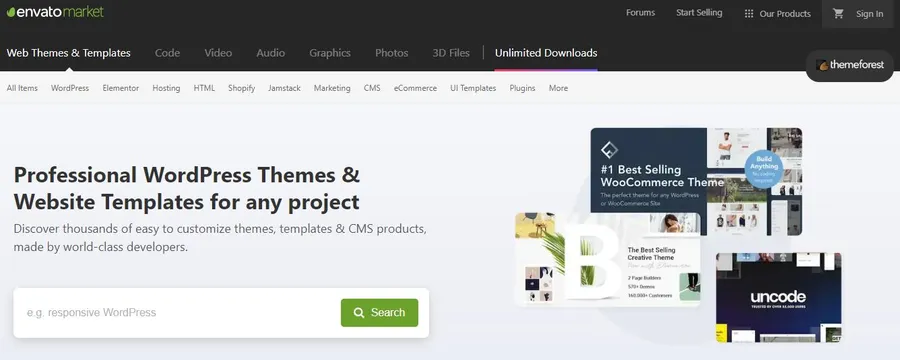
ThemeForest is the famous website marketplace for WordPress themes, UI kits, and graphic assets, known for its high-quality offerings and large user base.
Best for: Creators with unique and well-designed templates for popular platforms like WordPress.
Pros:
- Massive user base and strong reputation within the Envato Market network.
- Well-established review process ensures quality standards.
- Diverse range of template types and functionalities.
Cons:
- Can be highly competitive, especially for popular niches.
- Strict review process can be challenging for new creators.
- Lower commission rates compared to some marketplaces.
TemplateMonster
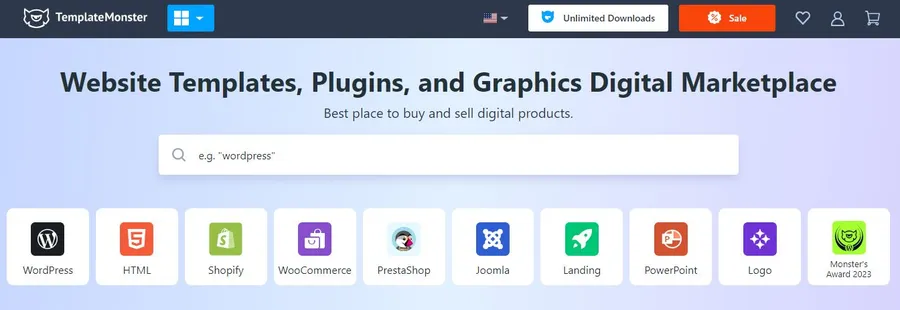
TemplateMonster comes with a massive library of templates (48,000+) for multiple platforms (CMS, eCommerce, etc.). Offers exclusive vendor options with higher commission rates.
Best for: Creators with a large template portfolio across diverse platforms.
Pros:
- Vast reach and exposure.
- Flexible pricing and vendor options.
- Wide platform variety.
Cons:
- High competition due to the massive template volume.
- Less emphasis on design trends and aesthetics.
- Can be harder for individual templates to stand out.
Etsy – Online Marketplace

Etsy is an online marketplace for handmade, vintage, and unique items. It’s a great place to sell if you’re a creative entrepreneur who makes things yourself or if you curate a collection of vintage finds.
Best for: Handmade goods, vintage items, craft supplies, art and photography, and unique gifts.
Pros:
- Large and engaged audience of buyers interested in unique items
- Relatively low fees compared to other marketplaces
- Strong community of sellers and buyers
- Easy-to-use platform
Cons:
- Can be competitive to get noticed
- Limited marketing tools
- Not suitable for mass-produced items
Amazon – Website Marketplaces
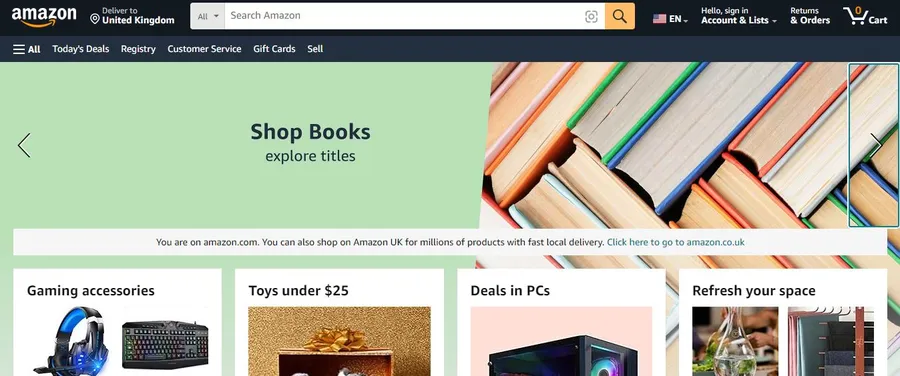
Amazon is a global eCommerce giant that offers a vast selection of products and services. It’s a popular choice for businesses of all sizes, from individual sellers to large corporations, to reach a massive customer base. That’s why it’s one of the most famous website marketplaces for any business to sell online.
Best for: A wide range of products, established brands, and sellers with fulfillment capabilities.
Pros:
- Huge customer base
- Brand recognition and trust
- Powerful marketing tools
- Fulfillment options like FBA
Cons:
- High fees
- Intense competition
- Complex platform
- Less control over branding
eBay – eCommerce Marketplace
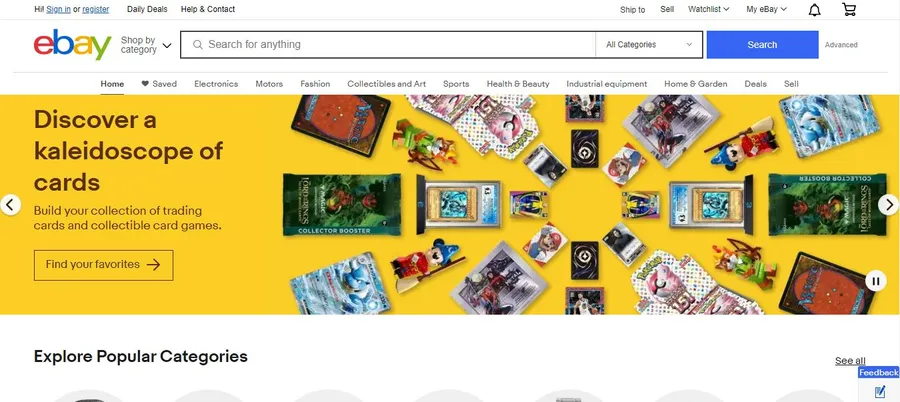
eBay is a global online eCommerce marketplace with established brand recognition and a vast audience. It offers a wide range of products, from antiques and collectibles to everyday items and electronics.
Best for: Established sellers with unique or niche products, collectors, and sellers with experience in online marketing.
Pros:
- Huge buyer base, leading to high traffic and potential sales.
- Flexible listing options, including auctions and fixed-price listings.
- Established reputation and buyer protection programs.
- Scalable platform, allowing you to expand your business internationally.
Cons:
- High competition, especially for common items.
- Seller fees can be high, especially for low-value items.
- Complex listing process and learning curve.
- Stricter policies and regulations compared to other platforms.
Shopee – Website Marketplaces
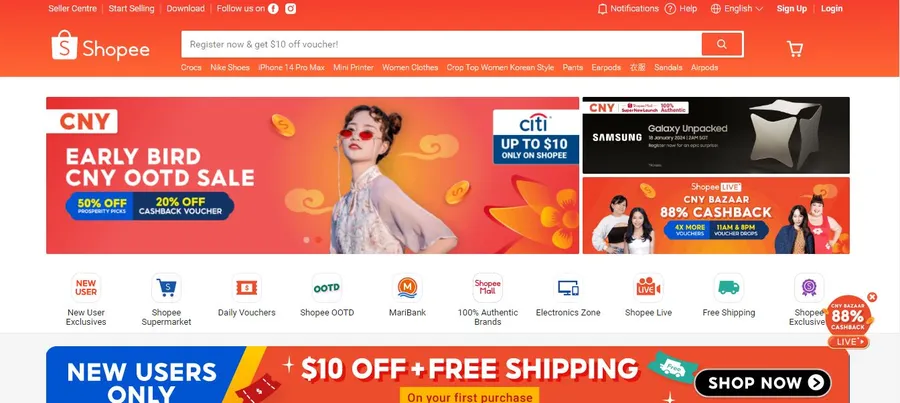
Shopee is among the best Southeast Asian website marketplaces that are rapidly growing popular for their mobile app, young user base, and flash sales.
Best for: Sellers in Southeast Asia, businesses with trendy and affordable products, and those comfortable with mobile marketing.
Pros:
- Lower seller fees than eBay.
- Strong mobile app with user-friendly interface.
- Active social media presence and influencer marketing opportunities.
- Growing customer base in Southeast Asia.
Cons:
- Limited international reach compared to eBay.
- Lower average order value than other platforms.
- Buyer protection programs may not be as robust as eBay.
- Higher competition in specific product categories.
Lazada – Marketplace Online Shopping

Lazada is another major Southeast Asian marketplace online shopping with a strong focus on branding and customer experience. It is similar to Shopee but with a stronger emphasis on established brands and higher-value products.
Best for: Established brands, businesses with high-quality products, and those willing to invest in branding and marketing on the platform.
Pros:
- Strong branding and marketing support from Lazada.
- Higher average order value than Shopee.
- Focus on customer experience and after-sales service.
- Growing customer base in Southeast Asia.
Cons:
- Higher seller fees than Shopee.
- Stricter listing requirements and quality control measures.
- More competition from established brands and official retailers.
- Limited international reach compared to eBay.
Taobao – Website Marketplaces
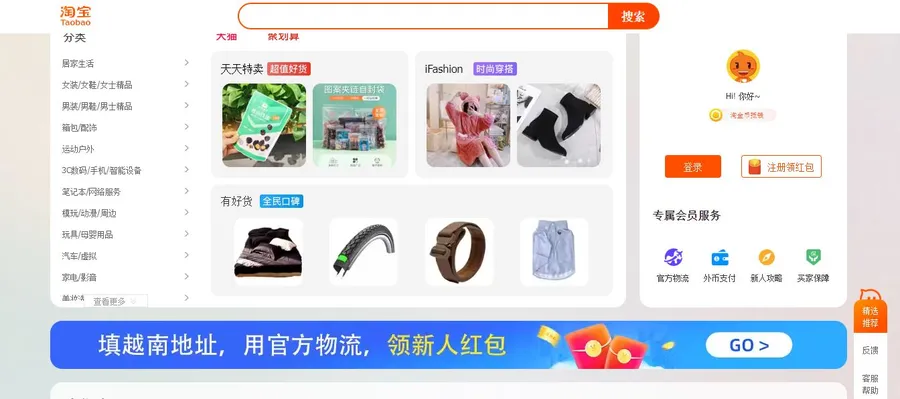
Taobao is China’s largest online website marketplace. It is known for its vast selection of products, competitive prices, and strong social shopping features.
Best for: Finding unique and affordable items, especially from Chinese sellers; engaging in social shopping with friends; and accessing a wide range of categories.
Pros:
- Huge variety of products, including niche and hard-to-find items.
- Competitive prices due to fierce competition.
- Strong social shopping features like livestreaming and group buying.
- Buyer protection programs and secure payment systems.
Cons:
- Language barrier for non-Mandarin speakers.
- Shipping times can be long, especially from international sellers.
- Authenticity concerns with some products.
- Complex return and refund processes.
Walmart – Best Online Marketplace
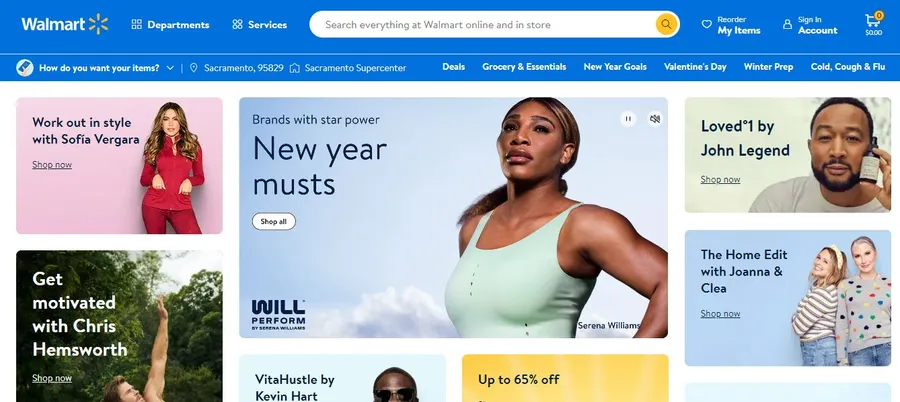
Walmart is the best online marketplace for the US, offering a wide range of everyday essentials, groceries, and brand-name products at competitive prices.
Best for: One-stop shopping for groceries, household essentials, and electronics at affordable prices.
Pros:
- Convenient and familiar for US shoppers.
- Fast and reliable shipping, often with free options.
- Large selection of popular brands and high-quality products.
- Easy return and refund processes.
Cons:
- Limited selection of unique or niche items.
- Higher prices compared to Taobao for some products.
- Less emphasis on social shopping features.
- May not offer international shipping.
Facebook Marketplace – Website Marketplaces

Facebook Marketplace is one of the best website marketplaces for buying and selling used and new items locally.
Best for: Finding used furniture, clothing, electronics, and other household items. Building personal connections with sellers, negotiating good deals.
Pros:
- Great deals on used items.
- No seller fees, making it affordable for individuals.
- Convenient for local pickup or delivery.
- Personal interaction with sellers.
Cons:
- Limited product selection compared to other platforms.
- No buyer protection programs or guarantees.
- Potential for scams or unreliable sellers.
- Requires more effort to research and negotiate.
Don’t forget to check out Lusion – a multipurpose eCommerce Shopify theme with fast and responsive designs.
Read More: AI eCommerce Platform: Best AI Tools for eCommerce Business


